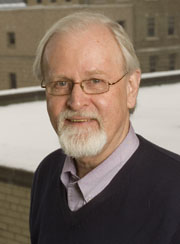If science can send rockets to Mars and Pluto, it can reduce world hunger and poverty, asserts Cornell food policy expert
By Susan S. Lang

ST. LOUIS -- Applying science and technology to build a Pluto-bound spacecraft that travels more than 10 times faster -- 47,000 miles per hour -- than a speeding bullet or a tiny cell phone that fits in a matchbox are great achievements. But what about applying technology to feeding the 800 million hungry people in the world whose plight isn't improving in this high-tech world?
"Science is bypassing poor people," said Per Pinstrup-Andersen, Cornell University's Babcock Professor of Food, Nutrition and Public Policy, at a panel discussion, Putting Science to Work for the Poor and the Environment: Achieving the Millennium Development Goals, today (Feb. 18) at the 2006 meeting of the American Association for the Advancement of Science. Pinstrup-Andersen also is chair of the Science Council for CGIAR, the Consultative Group on International Agricultural Research, the world's largest publicly funded international agricultural research organization.
"The common thinking among many is that science is too complicated to solve poverty problems, yet applying science in new ways to support national efforts in developing countries to reduce hunger and poverty is the only way we are ever going to alleviate some of the misery in this world," Pinstrup-Andersen said. "Yet, it's simply not being done."
He said that new research priorities, recently established by CGIAR's Science Council, give direction to institutions that invest in ways to reduce worldwide poverty. The goal is to help in developing research to improve agriculture, technology and food-policy initiatives to stimulate economic growth, particularly in sub-Saharan Africa and western Asia.
The new priorities are:
- helping developing-world farmers, so that they can more efficiently produce high-value foods, such as fruits, vegetables, animals and fish -- instead of staple crops, making their small farms more viable.
- sustaining biodiversity through better conservation of the genetic resources of crops, cattle and aquatic resources.
- promoting sustainable and integrated land, water and forest management practices through a holistic, systems approach.
- producing more and better food at lower cost through genetic improvements.
- improving institutions, such as farm organizations and nongovernmental organizations; infrastructures, such as phones, roads, education and health care; and markets for the poor.
Applying science's resources in these ways, he said, is imperative to address world hunger (see accompanying story on world hunger).
CGIAR's members include governments, international and regional organizations and private foundations investing in agricultural science to benefit poor farmers. The consortium is co-sponsored by the World Bank and three United Nations groups: the Food and Agricultural Organization, the International Fund for Agricultural Development and the U.N. Development Program. CGIAR supports 15 international agricultural research centers seeking to reduce hunger and poverty, improve human nutrition and health, and protect the environment.
Media Contact
Get Cornell news delivered right to your inbox.
Subscribe